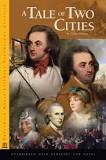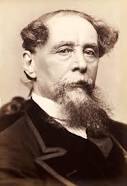A Tale of Two Cities Page #3
A Tale of Two Cities is a historical novel by Charles Dickens, set in London and Paris before and during the French Revolution.
“Guard!” said the passenger, in a tone of quiet business confidence. The watchful guard, with his right hand at the stock of his raised blunderbuss, his left at the barrel, and his eye on the horseman, answered curtly, “Sir.” “There is nothing to apprehend. I belong to Tellson's Bank. You must know Tellson's Bank in London. I am going to Paris on business. A crown to drink. I may read this?” “If so be as you're quick, sir.” He opened it in the light of the coach-lamp on that side, and read--first to himself and then aloud: “'Wait at Dover for Mam'selle.' It's not long, you see, guard. Jerry, say that my answer was, RECALLED TO LIFE.” Jerry started in his saddle. “That's a Blazing strange answer, too,” said he, at his hoarsest. “Take that message back, and they will know that I received this, as well as if I wrote. Make the best of your way. Good night.” With those words the passenger opened the coach-door and got in; not at all assisted by his fellow-passengers, who had expeditiously secreted their watches and purses in their boots, and were now making a general pretence of being asleep. With no more definite purpose than to escape the hazard of originating any other kind of action. The coach lumbered on again, with heavier wreaths of mist closing round it as it began the descent. The guard soon replaced his blunderbuss in his arm-chest, and, having looked to the rest of its contents, and having looked to the supplementary pistols that he wore in his belt, looked to a smaller chest beneath his seat, in which there were a few smith's tools, a couple of torches, and a tinder-box. For he was furnished with that completeness that if the coach-lamps had been blown and stormed out, which did occasionally happen, he had only to shut himself up inside, keep the flint and steel sparks well off the straw, and get a light with tolerable safety and ease (if he were lucky) in five minutes. “Tom!” softly over the coach roof. “Hallo, Joe.” “Did you hear the message?” “I did, Joe.” “What did you make of it, Tom?” “Nothing at all, Joe.” “That's a coincidence, too,” the guard mused, “for I made the same of it myself.” Jerry, left alone in the mist and darkness, dismounted meanwhile, not only to ease his spent horse, but to wipe the mud from his face, and shake the wet out of his hat-brim, which might be capable of holding about half a gallon. After standing with the bridle over his heavily-splashed arm, until the wheels of the mail were no longer within hearing and the night was quite still again, he turned to walk down the hill. “After that there gallop from Temple Bar, old lady, I won't trust your fore-legs till I get you on the level,” said this hoarse messenger, glancing at his mare. “'Recalled to life.' That's a Blazing strange message. Much of that wouldn't do for you, Jerry! I say, Jerry! You'd be in a Blazing bad way, if recalling to life was to come into fashion, Jerry!” III. The Night Shadows A wonderful fact to reflect upon, that every human creature is constituted to be that profound secret and mystery to every other. A solemn consideration, when I enter a great city by night, that every one of those darkly clustered houses encloses its own secret; that every room in every one of them encloses its own secret; that every beating heart in the hundreds of thousands of breasts there, is, in some of its imaginings, a secret to the heart nearest it! Something of the awfulness, even of Death itself, is referable to this. No more can I turn the leaves of this dear book that I loved, and vainly hope in time to read it all. No more can I look into the depths of this unfathomable water, wherein, as momentary lights glanced into it, I have had glimpses of buried treasure and other things submerged. It was appointed that the book should shut with a spring, for ever and for ever, when I had read but a page. It was appointed that the water should be locked in an eternal frost, when the light was playing on its surface, and I stood in ignorance on the shore. My friend is dead, my neighbour is dead, my love, the darling of my soul, is dead; it is the inexorable consolidation and perpetuation of the secret that was always in that individuality, and which I shall carry in mine to my life's end. In any of the burial-places of this city through which I pass, is there a sleeper more inscrutable than its busy inhabitants are, in their innermost personality, to me, or than I am to them? As to this, his natural and not to be alienated inheritance, the messenger on horseback had exactly the same possessions as the King, the first Minister of State, or the richest merchant in London. So with the three passengers shut up in the narrow compass of one lumbering old mail coach; they were mysteries to one another, as complete as if each had been in his own coach and six, or his own coach and sixty, with the breadth of a county between him and the next. The messenger rode back at an easy trot, stopping pretty often at ale-houses by the way to drink, but evincing a tendency to keep his own counsel, and to keep his hat cocked over his eyes. He had eyes that assorted very well with that decoration, being of a surface black, with no depth in the colour or form, and much too near together--as if they were afraid of being found out in something, singly, if they kept too far apart. They had a sinister expression, under an old cocked-hat like a three-cornered spittoon, and over a great muffler for the chin and throat, which descended nearly to the wearer's knees. When he stopped for drink, he moved this muffler with his left hand, only while he poured his liquor in with his right; as soon as that was done, he muffled again. “No, Jerry, no!” said the messenger, harping on one theme as he rode. “It wouldn't do for you, Jerry. Jerry, you honest tradesman, it wouldn't suit your line of business! Recalled--! Bust me if I don't think he'd been a drinking!” His message perplexed his mind to that degree that he was fain, several times, to take off his hat to scratch his head. Except on the crown, which was raggedly bald, he had stiff, black hair, standing jaggedly all over it, and growing down hill almost to his broad, blunt nose. It was so like Smith's work, so much more like the top of a strongly spiked wall than a head of hair, that the best of players at leap-frog might have declined him, as the most dangerous man in the world to go over. While he trotted back with the message he was to deliver to the night watchman in his box at the door of Tellson's Bank, by Temple Bar, who was to deliver it to greater authorities within, the shadows of the night took such shapes to him as arose out of the message, and took such shapes to the mare as arose out of her private topics of uneasiness. They seemed to be numerous, for she shied at every shadow on the road. What time, the mail-coach lumbered, jolted, rattled, and bumped upon its tedious way, with its three fellow-inscrutables inside. To whom, likewise, the shadows of the night revealed themselves, in the forms their dozing eyes and wandering thoughts suggested.
Translation
Translate and read this book in other languages:
Select another language:
- - Select -
- 简体中文 (Chinese - Simplified)
- 繁體中文 (Chinese - Traditional)
- Español (Spanish)
- Esperanto (Esperanto)
- 日本語 (Japanese)
- Português (Portuguese)
- Deutsch (German)
- العربية (Arabic)
- Français (French)
- Русский (Russian)
- ಕನ್ನಡ (Kannada)
- 한국어 (Korean)
- עברית (Hebrew)
- Gaeilge (Irish)
- Українська (Ukrainian)
- اردو (Urdu)
- Magyar (Hungarian)
- मानक हिन्दी (Hindi)
- Indonesia (Indonesian)
- Italiano (Italian)
- தமிழ் (Tamil)
- Türkçe (Turkish)
- తెలుగు (Telugu)
- ภาษาไทย (Thai)
- Tiếng Việt (Vietnamese)
- Čeština (Czech)
- Polski (Polish)
- Bahasa Indonesia (Indonesian)
- Românește (Romanian)
- Nederlands (Dutch)
- Ελληνικά (Greek)
- Latinum (Latin)
- Svenska (Swedish)
- Dansk (Danish)
- Suomi (Finnish)
- فارسی (Persian)
- ייִדיש (Yiddish)
- հայերեն (Armenian)
- Norsk (Norwegian)
- English (English)
Citation
Use the citation below to add this book to your bibliography:
Style:MLAChicagoAPA
"A Tale of Two Cities Books." Literature.com. STANDS4 LLC, 2024. Web. 23 Nov. 2024. <https://www.literature.com/book/a_tale_of_two_cities_19>.




Discuss this A Tale of Two Cities book with the community:
Report Comment
We're doing our best to make sure our content is useful, accurate and safe.
If by any chance you spot an inappropriate comment while navigating through our website please use this form to let us know, and we'll take care of it shortly.
Attachment
You need to be logged in to favorite.
Log In